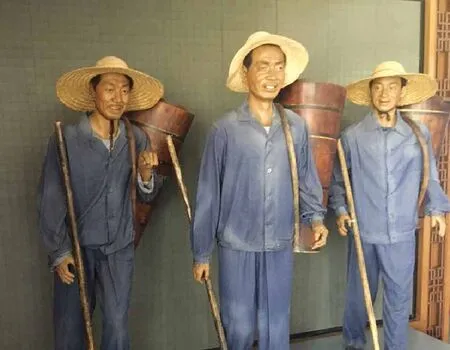RISE AND FALL OF THE NIGHT SOIL KING OF BEIJING
BY JERENIAH HENNE
RISE AND FALL OF THE NIGHT SOIL KING OF BEIJING
BY JERENIAH HENNE

statues of shi Chuanxiang and his assistants at Longtan Park
The high honors of a lowly laborer
宁肯一人脏,换来万户净:
挑粪工人时传祥光荣而跌宕的人生
His hand had shoveled shit his whole life. Now it was being held by the president of China. In 1959, Shi Chuanxiang (时传祥) stood in the Great Hall of the People and shook the hand of Liu Shaoqi (刘少奇). “Your work as a collector of night soil makes you a true servant of the people,” said Liu. “And as the president, I am also a servant of the people.”
Flashbulbs popped, and the following day a picture of the meeting between China’s head of state and the night soil gatherer from Beijing appeared in the People’s Daily. Overnight, Shi Chuanxiang, the Night Soil King of Chongwen District, was famous around the country.
It was a shining moment for Shi, the culmination of a long malodorous march to respectability. But it came at a very high cost.
Shi was born in 1915 in Shandong Province to a poor family. Like many young men at the time, he sought to escape the misery and poverty of the countryside. He drifted to Beijing where, like other young rural refugees,he found little opportunity. Undaunted, Shi took what work was available: Going from hutong to hutong in Beijing, cleaning out latrines by hand and saving the contents in a wooden bucket.
It was backbreaking and stinking work. The buckets could weigh as much as 50 kilograms when full. Local residents gave the night soil collectors a wide berth.In Republican era Beijing, they were untouchables, bucolic rubbish beneath contempt.
Like many dirty but indispensable industries, the night soil trade in Beijing was also rife with corruption. Gangs competed for routes and districts. Local association heads routinely roughed up collectors,extorting money or shorting wages.
According to Shi, his life improved only after the founding of the PRC in 1949. Trucks replaced wheelbarrows,and Shi found himself taking on a new role as a member of the sanitation workers committee for his district.
As with Lei Feng and other “model workers” and “Socialist Heroes” from the Mao era, scholars have to take care to separate history from hagiography. But by all accounts, including later Party media interviews with his children, Shi was very much devoted to his job and a selfless worker who believed deeply that what he did—whatever others might think—was crucial to the success of the revolution.
As for his calling, Shi once remarked:“I’d rather be dirty myself so everyone else can stay clean.”
collection rates of waste for the district showed a marked increase. Soon, the Chongwen Sanitation Team was the envy of the city and officials from other districts began to ask just how Chongwen stayed so clean. And every day, Shi and his assistants shouldered their loads, an indefatigable bucket brigade scooping poop from the latrines across their neighborhood.
Shi’s dedication didn’t go unnoticed or unrewarded. As a result of the success of his sanitation brigade, Shi was named a deputy to the National People’s Congress from the Chongwen District of Beijing. Later that same year, he achieved his goal of becoming a member of the Chinese Communist Party. It was a remarkable rise for the night soil collector from rural Shandong.
In 1959, Shi was named a national model worker and invited to attend a ceremony at The Great Hall of the People. It was there, on October 26, that he and Liu Shaoqi had their famous handshake, making Shi an overnight sensation.
At first, the honors poured in. Paintings of the historic meeting appeared, with Shi casually drinking tea and conversing with President Liu, the latter holding his ever-present cigarette. Shi appeared on television and in interviews for the newspaper. His life story was even adapted for the stage. Students, including apparently Liu’s own daughter Liu Tingting,volunteered to serve afternoons on Shi’s cleaning squad, overcoming their squeamishness to learn about the lives of workers. During National Day ceremonies in 1966, Shi finally met Chairman Mao Zedong. Premier Zhou Enlai even made a toast to Shi at the banquet that evening.
But one single handshake back in 1959 had tragically tied Shi’s fate with that of Liu Shaoqi.
In 1966, Liu was forced from office. He died in prison in 1969. Shi, a model worker and the selfless hero of sanitation, would ultimately share Liu’s misfortune. Soon after Liu’s fall from power, the Party faithful branded Shi a scab and a criminal for his association with the “Capitalist Roader” Liu Shaoqi. For the next five years, Shi endured over 100 struggle sessions and beatings which left him paralyzed and incontinent. He was finally forced out of Beijing and back to his home province of Shandong. In 1975, Zhou Enlai ordered Shi be transported back to the capital for medical treatment, but it was too late. Shi died later that year.
Shi’s name was rehabilitated following the death of Chairman Mao. His son took over Shi’s old job on the sanitation brigade in Beijing. Today, Shi’s unselfish commitment to clean latrines is once again being celebrated in school texts as a model for pampered urban youth. There was even a 2003 TV miniseries dramatizing the life and times of China’s most famous night soil gatherer.
In Longtan Park, in the same area of Beijing that Shi once patrolled with bucket and shovel, stands a memorial to this unlikely hero. A short distance from a memorial hall for the famous Ming Dynasty general Yuan Chonghuan is a museum and shrine to Shi Chuanxiang. There are statues of Shi and his assistants,each ready with their buckets, and a bronze likeness of Shi, in all of his dung-gathering glory, standing just inside the entrance. There is a small collection of photographs and articles written during Shi’s moment of fame from the 1960s, and a small room contains his modest personal effects, including his hat, boots, and satchel.
Just last year, on the 100th anniversary of Shi’s birth, the Beijing city government held a symposium to celebrate the life and career of Shi. Even a century later,Shi Chuanxiang’s legacy as the king of the night soil collectors continues.

